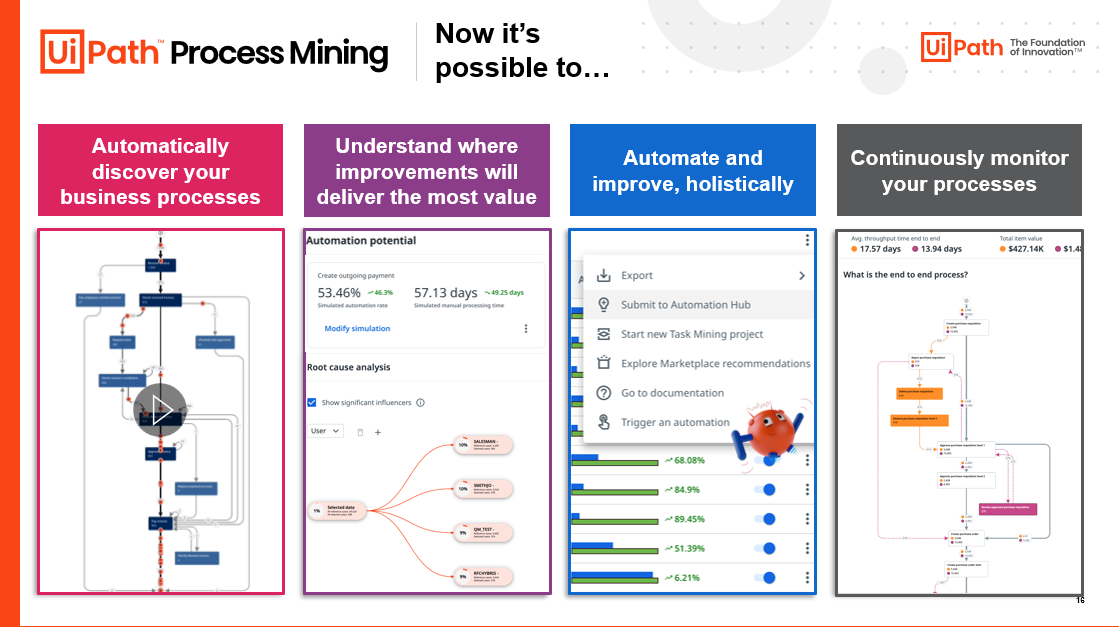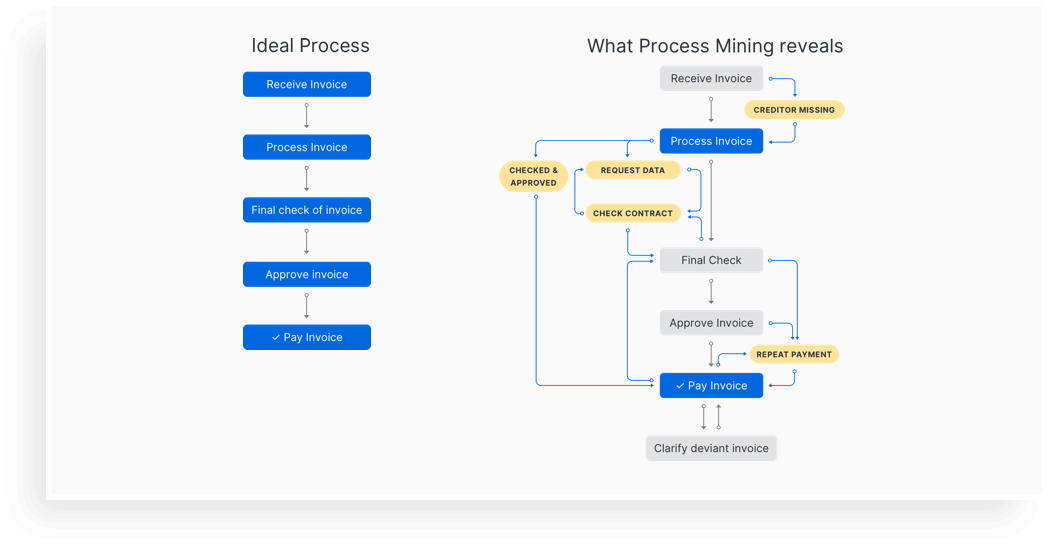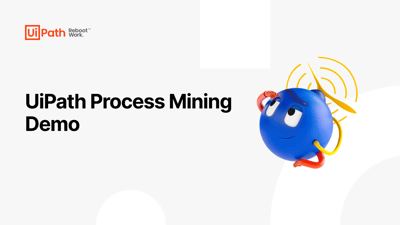What is Process Mining?
Process mining is a technique to analyze, improve, and track processes. In the old days of managing business processes, people used meetings, interviews, and simply observing things to understand how processes worked. However, this approach often painted an incomplete, and one-sided view of processes. It also meant people spent more time understanding processes rather than making them better. Now, with process mining, we can use the data already stored in systems and applications to automatically show how processes are really executed.
Why use process mining?
Process mining enhances and accelerates the overall impact and speed of process improvement and process automation.
Process mining connects to source systems for a continuous view into how business processes are executed. With AI-driven dashboards and visualization techniques, you save time on analysis and spend more time on automating, improving, and tracking progress for better business outcomes.
It's the go-to tool for understanding where your processes are and where they should be, whether you're into automation, process reengineering, or both.
Process mining benefits
Survey processes everywhere across the enterprise—at high scale and low human effort
Analyze processes fully and accurately based on the facts
Zero in on bottlenecks, deviations and inefficient processes that should be rethought or automated
Continuously monitor processes and measure improvements
Simplify compliance, with full audit trails
Use in any industry: banking and financial services, insurance, manufacturing, or healthcare and beyond
Analyze virtually any process in any functional area: contact centers, purchase-to-pay, order-to-cash, and more

Learn how process mining can help evolve end-to-end financial processes
Dive into the e-book series to learn how to start evolving processes starting with process mining.
How does process mining work?
As people and software robots work with corporate IT systems, their activities are captured by those systems.
Process mining transforms this data into an event log—and then creates visualizations of the end-to-end process along with insightful analyses.
So you’ll have the facts you need to understand, improve, and monitor how things get done… anywhere they’re getting done.

Step 1: Use digital footprints to discover your processes
Every enterprise system—like SAP, Salesforce or Oracle—captures event data related to your processes.
Process mining reads this data and transforms it into an event log.
This event log contains three key pieces of information vital for process mining: a time stamp, a case ID, and an activity.
Step 2: Zoom in on every process
Using the event log, process mining automatically creates a process graph that lets you understand every detail of your process—including the timing of each step and all the variations in process flows. That’s exactly the level and type of detail you need.
To give you an example, the process graph on the left only captures the main steps in an “ideal” process (in process mining, this is called the ‘Happy Path’). The process graph on the right, created from event log data, reveals all the process deviations and exceptions— bottlenecks, workarounds, and workflow inefficiencies you need to address.
Now you have fact-based information you need to get started with optimization or automation efforts.

Step 3: Focus, fix, and prioritize
The visualization capabilities built into advanced process mining tools help you zero in on what should be optimized, how to do it, and what the return on your efforts will be. You can easily build and prioritize your automation pipeline or process optimization efforts.
You’ll be able to immediately understand the impacts of proposed process changes or automations—including costs saved and effort required.
And you can build a robust, complete, high-ROI pipeline for your automation programs. (With the UiPath Platform, you’ll manage your pipeline in Automation Hub).
Step 4: Monitor performance to keep track (and keep compliant)
Has what you’ve done made a difference? Are you getting the performance lift you expected?
Advanced process mining solutions will continuously monitor and measure the results, so you’ll be the first to know if you’re on track or off base. Plus, you get a full audit trail for compliance purposes.
78% of people who automate say process mining is key to enabling their RPA efforts
Source: Process Mining Sector Scan, January 2020, independent third-party study
That’s because process mining…
Provides the full context and end-to-end perspective needed to improve processes and make sure automations will deliver results
Helps improve processes before automating them, to get the maximum benefit
Identifies the most valuable, impactful places to insert automation
Continuously monitors automation performance and ROI
Drives better business outcomes by linking business rules with automation assessment
Helps build an automation program on facts, data, and ongoing measurement

Video Demo
UiPath Process Mining demo
Get an overview of process mining capabilities in the UiPath Platform

Case Study
From data to action
Read how İşbank are using process mining to drive operational efficiency
ON DEMAND

Webinar
Continuous Discovery Summit
Watch the summit to see how Process Mining, Task Mining, Communications Mining, and Automation Hub combine to drive process improvement and automation.
